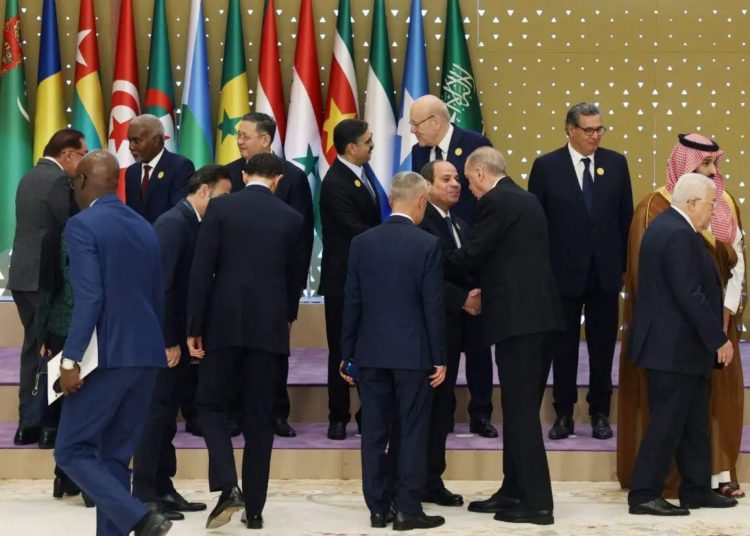Historically, Arab countries have endeavored to elevate the Palestinian issue to a matter of collective regional concern, particularly in light of the Arab League’s inception goals, one of which was to address this very issue. Despite this shared objective, a unified stance on the Palestinian question has remained elusive. Nearly seven decades on, individual Arab states continue to interpret the situation through the prism of national self-interest.
In the wake of the Gaza crisis following the “Al-Aqsa Flood” operation, despite a facade of consensus, Arab states pursued divergent courses of action. Each sought to assert itself as the preeminent force in this scenario, leveraging their distinct capacities to do so.
Given the lack of capability for military or security intervention in the Palestinian crisis, Arab states have instead sought influence through political avenues. In the period subsequent to the October 7 operation by Hamas, Saudi Arabia actively attempted to assume a leadership role within the Arab world, initiating peace efforts through political and diplomatic channels. It hosted two pivotal meetings — one for the foreign ministers of the Organization of Islamic Cooperation in Jeddah and the Arab-Islamic Summit in Riyadh — aiming to establish itself as a central diplomatic player in addressing the Gaza situation.
However, Saudi Arabia faced competition in the political sphere of Gaza, notably from Egypt, Qatar, and the United Arab Emirates (UAE). Each of these nations exerted efforts to shape outcomes in alignment with their regional standing and international relationships. Qatar, for instance, sought to eclipse Saudi Arabia’s influence by heightening its international profile through active participation in truce and prisoner exchange negotiations.
The principal challenge within this dynamic was the lack of a collaborative drive among the Arab contributors in the Gaza crisis. The pursuits of the states involved skewed toward rivalry rather than synergy. There was a palpable absence of intention to support fellow Arab entities in reaching a resolution. This discord was epitomized by the inconclusive Cairo meeting on October 20, purportedly a significant step toward crisis resolution, which concluded without a joint declaration. Further attempts by Egypt to orchestrate a second summit were thwarted by dissonance among the Persian Gulf Cooperation Council (GCC) members.
Media sources indicate a reluctance on the part of Saudi Arabia, Qatar, and the UAE to operate under the aegis of Egypt’s longstanding influence in the Palestinian dispute—attitudes that have garnered distinct contours in the post-Abraham Accords era, as these nations chart divergent courses from Egypt in the conflict.
Furthermore, it has been reported that France’s initiative to replicate the diplomatic initiative seen in the Baghdad summit—which aimed to remedy Iraq’s political gridlock—by proposing a Cairo Summit, faltered. The intention was to convene influential Arab nations central to the Palestinian issue, including Saudi Arabia, Qatar, the UAE, Jordan, and the Palestinian Authority, in an Egyptian-led assembly, thereby reaffirming a role for Egypt in West Asian geopolitical affairs. Resistance from Riyadh and Abu Dhabi, reminiscent of their stance in the Baghdad conference, highlighted their disinclination to align with French-led initiatives.
In essence, these nations are not only reluctant to acquiesce to Egypt’s or France’s leadership in the Palestinian conflict but are proactively forging their own pathways. Their primary objective appears to be capitalizing on alliances with proxies within the crisis to promote their self-determined agendas.
Reports suggest that Saudi Arabian efforts are currently directed toward positioning Hussein al-Sheikh, a close associate of Mahmoud Abbas and the secretary of the Palestine Liberation Front Council, as a pivotal figure in the future political landscape of Palestine and Gaza. Meanwhile, the United Arab Emirates is reportedly advocating for Mohammed Dahlan, or an ally within his sphere of influence. In an alternate vein, Egypt, France, and the United States appear to be contemplating individuals such as Salam Fayyad, recognized for his role within the technocratic echelons of the authority.
These developments underscore the perennial divergences among Arab countries regarding Palestine, with each state endeavoring to advance its distinct interests through the Palestinian issue. Beyond the consensus regarding the establishment of an independent Palestinian state within the 1967 borders and adherence to the two-state solution, there lies a profound discord in the minutiae pertaining to Gaza’s political destiny. Furthermore, despite ongoing diplomatic engagements, these Arab states have yet to successfully broker a ceasefire or facilitate the delivery of humanitarian assistance to the beleaguered inhabitants of Gaza.






